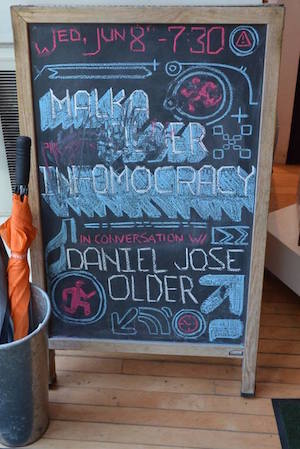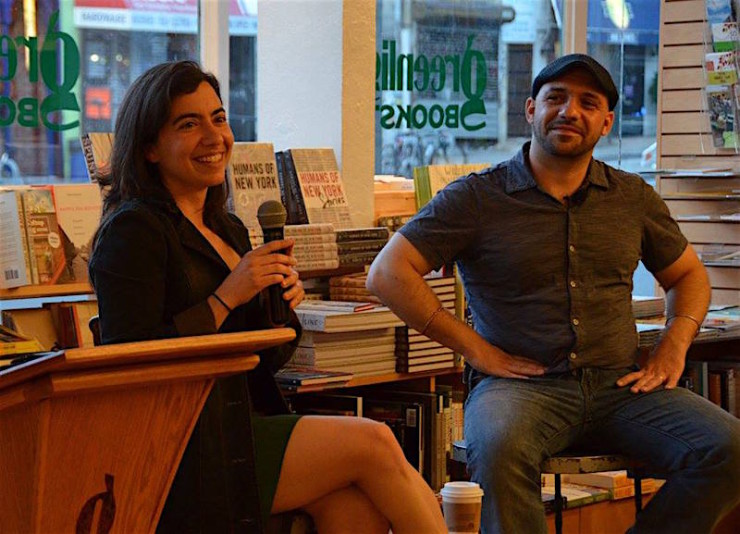There was already a nice crowd gathered for the concatenation of Olders at Greenlight Bookstore, and by the time the reading began, the seats were full, and many people already had copies of Malka Older’s debut novel, Infomocracy. The novel takes us into the near-future, twenty years after Information, a powerful search engine monopoly, guided the world in a shift from a fractious collection of nation-states to global micro-democracy. Now the world is entering another election year, and idealists, policy wonks, spies, and rabble-rousers are all struggling to see which democracies will come out on top.
Older read, and then her brother, Bone Street Rumba series author Daniel José Older, joined her in front of the crowd for a lively interview and Q&A. You can read the highlights from their conversation below!
This party was something of a family affair. The authors’ parents were there, along with their partners and Malka’s two-year-old daughter. Her daughter took on the important role of greeter, waving at people as they came into Greenlight. She joined in later as well: part way through the reading, the baby walked up to Older and said “Up!” Without missing a syllable Older scooped her daughter up, settled her on her hip, and continued.
DJO: I love this book. I know I’m supposed to cause you’re my sister, but I really love this book. Could you talk about the moment it was born?
MO: It was a conglomeration of a few things. I was interested in a new world order, where, instead of nation-states, each country can be scattered across continents. With technology, we don’t need to be bound to contiguous borders, or physical proximity. In Infomocracy, the population is divided into “centenals”—100,000 people have jurisdiction, and can vote to belong to any government in the world. There are idealist governments, corporates, interest groups… having worked in places with secessionist groups, I was struck by the way we still want our countries to be physically large. So I was wondering, how can we get away from that? Size is not so important anymore, so how will a government work once we move away from that idea?
Infomocracy also came from frustration with the election cycle from four years ago. When you tried to talk about why you were supporting a candidate, you talked past people because people literally had different facts about the candidates. At that point, it’s not even about issues—it becomes hard to talk about basic principles. In the book, we have the power to be able to state: this is a fact. We have that capacity with the organization Information. But it causes other problems.

DJO: That’s all really deep, but what you just described is a political treatise. You wrote an amazing novel. Where did the human element come in?
MO: We begin the book in a pachinko parlor. And it’s a real pachinko parlor in Japan. I was there, working for relief after the tsunami, and I would pass by it. It had a sign that said “21st Century”—but it looked really run down. Already, in 2011, it looked old. So that got me in the mindset of writing the future…
Baby Older: Mama!
MO: Yes?
DJO: Questions at the end.
[Laughter, and then Baby Older is taken for an evening constitutional so Malka and Daniel Older can dig into their conversation.]
MO: …because I was in Japan, which obviously cyberpunk has a strong basis in Japan, so that helped me get into the mindset.
DJO: You have a lot of different characters here, and there are moments where we see multiple characters reacting to the same event—very Rashomon—what were the main influences on your writing?
MO: Snow Crash, William Gibson, and The West Wing—particularly the seasons that deal with campaigning.
DJO: Your future is a run down place, instead of going for an ultra-slick future you have broken down technology, broken down systems. We grew up watching Star Wars—it was the first time we saw space not lookin’ so slick. So separate from the theoretical underpinnings—how do you balance your opinions with telling the story?
MO: Looking into the future of microdemocracy—it’s having difficulties. They’ve had twenty years of it [when Infomocracy begins] and it’s falling apart a little bit. It’s imperfect, and having those patches showing was important to me. What I tried to do was have my opinions come out on the process side. Not just why people choose the way they do in a democracy, but how does the choosing happen? It’s important to think about the process of democracy. Democracy is not a monolithic word that means the same thing everywhere.
DJO: Are you a gardener or an architect?
MO: Oh, gardener.
DJO: You really just, go?
MO: Oh yeah. I have an idea of a beginning point and an end point, but when I read I don’t like knowing where it’s going to go, you know? I love it when big plot points just… pop up.
DJO: You’ve written men and women, characters of different races and backgrounds. What’s your approach to ‘writing the other’?
MO: Most of the characters are from cultures that I spent a significant amount of time in. And I really felt like all the characters were part of me.
DJO: What can you tell us about the sequel?
MO: [Looks out to editor Carl Engle-Laird in the audience, everyone laughs] I’d like to say that it’s better? [more laughter] This world has so much in it that I can continue to explore. The new book will be set about two years after this one, and unlike Infomocracy, it’s not during an election cycle!
DJO: And did this book feel different from your other writing, as you worked on it?
MO: This book probably has more action. It’s the first novel-length thing I’ve written, and also, since it’s sci-fi—if you have a problem, you can just invent a new technology to solve it!
With that, the Olders turned to the audience for Q&A.
So, we hit the ground running at the beginning of the novel. Do you have ideas about the start of Information?
MO: Yes. But the book begins with it up and running for twenty years…but maybe I’ll explore it in a prequel?
The near-future seems to be having a moment right now, culturally, with things like Mr. Robot and Orphan Black. Does it feel that way as a writer?
MO: Yeah! It was important for the book not to be too far in the future. I wanted to work with the geopolitical structures we have now. Technology I moving very quickly now, and it’s terrifying, but also so cool. So I wanted to take one little step into the future, and see what impact a small change has on the larger society. I think dystopia is really overused now. Utopia and dystopia- they’re impossible ideals. I was surprised by the reviews calling the book cynical. Which I guess shows how cynical I am? Cause I see it as a hopeful book. People are working and trying to make things better.
The next question asked if Older thought she might be foreshadowing the future.
MO: As a sci-fi writer, you always hope that your ideas will become reality. There’s also an element of deep structural things that haven’t gone away, that just keep recurring. So in that way, it’s a descriptive book of the present. Just look at this country—even apart from the political factions, we have so many different industries. Why do we need to be physically, geographically connected?
Next was a question for both—You’re siblings that both work in non-realist settings. How is it, being siblings who are both writers?
MO: We do really go back and forth with each other. We’re in very different areas of speculative fiction…
DJO: She was the bigger reader. All the Lord of the Rings books I stole from her –
MO: In that I loaned them to him willingly –
DJO: And then I didn’t give them back! But our dad is a big sci-fi nerd, and our mom is a magical realism nerd.
MO: We also both have different careers –
DJO: In emergency services? Which is weird? And I think we have the same sense of humor, and we both deal with systems in different ways in our work. And we rely on each other to bounce ideas back and forth. The “O” section of sci-fi is very small. It’s like, us, and Nnedi Okorafor.
Then Daniel Older had a few more questions of his own, as he wanted to talk further about his sister’s writing process.
DJO: You’re a black belt. Your fight scenes kick ass. Is this connected?
MO: I studied kitana and that helped the most. It was fun to play with which weapons would be in play in the future. I wanted to get away from guns. I was reading Austin Grossman’s book You about an immersive game where and there are no guns, because it isn’t as much fun, which you can also see that by looking at action movies from other cultures.
DJO: What’s your approach to editing?
Editor Carl Engle-Laird: I can leave if you want
[Laughter]
MO: I added about 20,000 words.
[DJO looks shocked.]
Carl: The first version was about 40,000 words, now it’s about 100,000.
DJO: Who adds 60,0000 words in editing???
[A slight argument ensues about the nature of editing]
DJO: I know we dreamt of this moment separately [he motions to indicate the two of them, published authors, in front of a roomful of book lovers] so, besides great, what does this feel like?
[Laughter]
MO: Beyond the reviews—a lot said ‘this book is about politics and elections, and that sounds boring, but it isn’t!’ And that made me happy. To have that conversation started is amazing. I’m also giving a percentage of my profits to a non-profit called Accountability Lab. They host the Integrity Idol, where people can nominate under-appreciated community workers, so people who make a difference can be celebrated. So, by buying the book you’re also engaging in the real world, too, and by reading it you’re connecting to issues that are important right now.
You can read the first five chapters of Infomocracy here on Tor.com!










